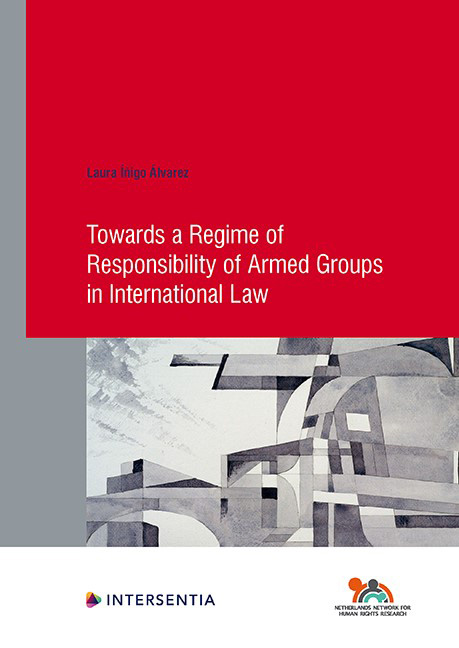Book contents
- Frontmatter
- Acknowledgements
- Contents
- Abbreviations
- Chapter I Introduction
- Chapter II The Necessity of a Responsibility Regime for Armed Groups in International Law
- Chapter III Developing a Responsibility Regime for Armed Groups in International Law
- Chapter IV Attribution of Conduct to Armed Groups
- Chapter V The Obligation to Provide Reparations by Armed Groups
- Chapter VI Conclusions
- Bibliography
- Table of Instruments
- Table of Cases
- Annex I Peace and Ceasefire Agreements
- Curriculum Vitae
- Human Rights Research Series
Chapter II - The Necessity of a Responsibility Regime for Armed Groups in International Law
Published online by Cambridge University Press: 22 December 2020
- Frontmatter
- Acknowledgements
- Contents
- Abbreviations
- Chapter I Introduction
- Chapter II The Necessity of a Responsibility Regime for Armed Groups in International Law
- Chapter III Developing a Responsibility Regime for Armed Groups in International Law
- Chapter IV Attribution of Conduct to Armed Groups
- Chapter V The Obligation to Provide Reparations by Armed Groups
- Chapter VI Conclusions
- Bibliography
- Table of Instruments
- Table of Cases
- Annex I Peace and Ceasefire Agreements
- Curriculum Vitae
- Human Rights Research Series
Summary
INTRODUCTION
This study starts from the premise that there is a lack of development of the rules regulating the responsibility of armed groups as such in international law. While armed groups are gaining power and control over territories globally, many of their actions remain unaddressed by international law in a systematic manner. Indeed, although there are certain rules regulating the conduct of armed groups during armed conflict, the existing legal framework seems to be fragmented. There are primary obligations deriving from IHL for NIAC; there are provisions for successful insurrectional movements that become a new state or government in a territory; and there are rules on the criminal responsibility of members of armed groups. Nevertheless, there is no comprehensive set of rules that regulates the consequences of violations of international law committed by armed groups. At the same time, there has been extensive scholarly attention to the issue of primary obligations of armed groups, but the question of their international responsibility remains largely underexplored.
For the purpose of this chapter, it is key to understand the existing framework of responsibility in international law, its evolution and the actors that this regime covers. The chapter will first describe the concept of responsibility and its evolution in international law from a historical point of view. This is essential to understand why this topic was considered relevant for codification under international law and why it was necessary to develop this concept separately in international law. This historical overview will be complemented with an analysis of this notion from a philosophical and political science point of view. Philosophical and political science studies provide a rich understanding of the issue of responsibility both from an individual and collective perspective. In particular, the notion of ‘collective responsibility’ has been analysed by these fields that have developed several theories to justify its application. They could, therefore, bring additional insights into the current research and offer a more conceptually grounded legal analysis of the notion of responsibility in international law.
Secondly, the chapter will provide a systematic review of the current legal framework applicable to armed groups as well as the mechanisms that directly or indirectly address violations of international law committed by such groups.
- Type
- Chapter
- Information
- Publisher: IntersentiaPrint publication year: 2020



